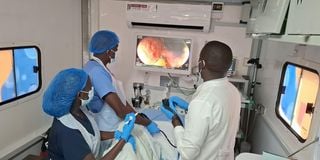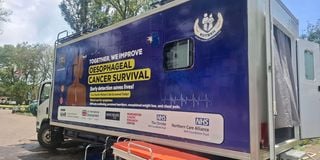Doctors camp in Nakuru to investigate possible link between esophageal cancer and hot tea

Medical practitioners from KUTRRH and PGH collect samples from Client 001 for further testing at the Nakuru Teaching and Referral Hospital (PGH) on October 31,2025.
Could your daily cup of hot tea be putting you at risk of developing cancer of the food pipe?
That’s one of the questions health researchers are asking as they carry out a month-long study in Nakuru County to demystify esophageal (food pipe) cancer, one of Kenya’s deadliest yet least understood diseases.
The research, led by experts from the Kenyatta University Teaching, Referral and Research Hospital (KUTRRH) in partnership with the University of Manchester, is funded by the National Institute for Health and Care Research (NIHR) in the UK.
According to Shem Peter, a Senior Research Officer at KUTRRH, esophageal cancer is the fourth most common cancer in Kenya but has the highest mortality rate.
“The national incidence is about 12.7 per cent, while mortality is around 12 per cent. It’s almost as though if you are diagnosed, you die,” he says. “Compare that with prostate cancer, which has an incidence of 40 percent but a mortality of only 15 percent, because it’s detected early.”
He says this alarming trend has prompted researchers to dig deeper into the disease and the factors behind it.
“We are asking: is it hot tea? Is it something in the Rift Valley environment? Could it be ethnicity, diet, or even genetics? These are the questions we hope this study will answer,” Peter notes.
Nakuru lies within what scientists call the Sub-Saharan esophageal cancer belt, a stretch from Ethiopia to South Africa where cases are unusually high.
Researchers believe uncovering why this region records so many cases could help shape prevention and early detection efforts across the country.
The team, working with the Nakuru Teaching and Referral Hospital (PGH), is screening residents across the county.

The mobile truck where -free and early screening of esophageal (food pipe) cancer services are being conducted at the Nakuru Teaching and Referral Hospital (PGH) on October 31,2025.
“We are undertaking early esophageal cancer-free screening services to persons aged 18 years and above who meet the criteria,” he says.
“We are looking for people experiencing difficulty swallowing with pain or without pain, unexplained weight loss, or pain when swallowing.”
Peter adds that age, gender, and lifestyle remain major risk factors.
“We see higher cases in people above 50, in men, and among those who use alcohol or tobacco chronically,” he observes.
He also points out that one reason esophageal cancer claims so many lives is late diagnosis, often caused by the high cost of testing.
“Endoscopy, the main diagnostic test, can cost up to Sh. 35,000 in private hospitals,” he says. “This is why people delay or never come forward at all.”
Beyond diagnosis, the study also has a research component. Last year, the team conducted a knowledge, attitudes, and practices survey in Nakuru to understand how residents perceive the disease. Those findings informed the current awareness campaign running through November.
“We want to replace myths with facts. The idea is to help people understand the disease better, come forward early, and improve survival chances,” Peter says.
Dr. Joy Mugambi, the County Director for Health Administration and Planning, says that to reach the community, the team is working closely with Community Health Assistants and Promoters, who have been trained to conduct household mapping and educate residents. They are helping identify those at risk and encouraging them to come forward for screening.
“We want to understand whether it’s linked to the foods we eat, our environment, or even our genes,” she explains.
Dr Mugambi adds that the campaign also seeks to dispel myths, such as the belief that taking hot tea causes esophageal cancer, by using research to separate fact from speculation.
Screening is free, and treatment for early cases is covered under the Social Health Authority (SHA), and results are provided within two weeks of testing.


